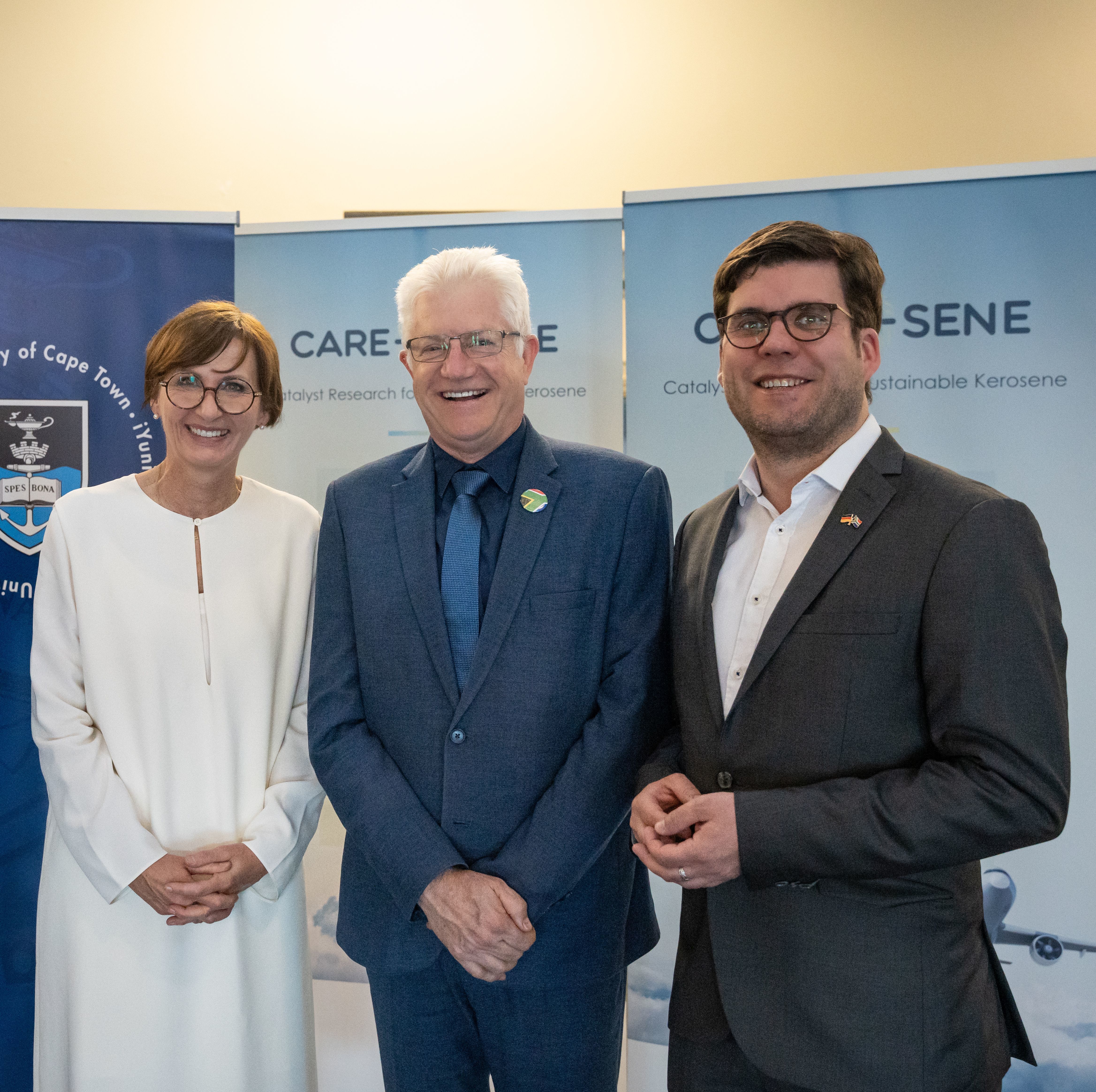
Bundesministerin Bettina Stark-Watzinger, Premierminister der Provinz Westkap Alan Winde, Project Manager Dr. Daniel Frank, DECHEMA e.V., im Katalysezentrum der Universität Kapstadt / Südafrika
.............
Federal Minister Bettina Stark-Watzinger, Premier of the Western Cape Alan Winde, Dr. Daniel Frank, DECHEMA e.V. | catalysis centre at the university of Cape Town / South Africa
© BMBF / Stefan Möhl 2023
Hydrogen as a vision of a green future - German experts accompany Federal Minister Bettina Stark-Watzinger to Southern Africa
The German Federal Minister of Education and Research, Bettina Stark-Watzinger, was accompanied on her delegation trip to South Africa and Namibia by scientists and advisors from the Germany based institutions DECHEMA Gesellschaft für Chemische Technik und Biotechnologie e.V. and ISOE - Institute for Social-Ecological Research. In the "GreeN-H2 Namibia" project, they are investigating how a hydrogen economy can be successfully established in Namibia and the possibilities for exporting the hydrogen to Germany.
The delegation trip took Minister Bettina Stark-Watzinger and her delegation to Cape Town and the Namibian capital Windhoek. In addition to the topics of health and biodiversity, the main focus was on green hydrogen. Both South Africa and Namibia have ideal conditions for producing green hydrogen and exporting its derivatives, such as ammonia (Namibia) and aviation fuel (South Africa). The first export agreements with European companies have already been signed.
The trip ended in Windhoek, where the Namibian President Dr. Hage G. Geingob welcomed the delegation. At the State House, the Federal Minister handed over grants for four pilot projects that are being funded by the Federal Ministry of Education and Research (BMBF) with almost €30 million as part of the German-Namibian Hydrogen Partnership. The projects deal with the production and use of green hydrogen and will present initial results at the end of 2023.
The minister also officially launched the Youth for Green Hydrogen Scholarship Program. This scholarship program enables young Namibians to combine their education and studies with stays at German universities. In the first round, 64 master's scholarships were awarded and another 34 for training.
During his stay in South Africa, Dr. Daniel Frank, coordinator of the GreeN-H2 Namibia project at DECHEMA, met with the Premier of the Western Cape, Alan Winde, and his staff. They discussed to what extent the results from the GreeN-H2 Namibia project could also be used for the Western Cape Province. Further discussions on possible collaboration are to follow. In particular, the water requirement for the production of hydrogen will play a role: "Without water, there is no hydrogen; we are experiencing this in Namibia and the Western Cape in particular. We also want to create synergies here, since much of our work in Namibia is also transferable to other regions - we will continue to expand the cooperative idea of our activities," says Daniel Frank.
At the same time, Dr. Martin Zimmermann, representative of the GreeN-H2 partner ISOE, traveled to northern Namibia with other colleagues and Till Mansmann, Innovation Commissioner "Green Hydrogen" at the BMBF, to participate in the groundbreaking ceremony of the Daures Green Hydrogen Village.
The project team GreeN-H2 Namibia of DECHEMA and ISOE travels regularly to Namibia to be able to accompany the progress of the pilot projects, but above all to achieve a knowledge transfer together with all stakeholders along the value chain for green hydrogen, as well as to publish studies selectively. In a first publication planned for summer 2023, it will be shown what impact brine from seawater desalination has on maritime life and what measures are possible for sustainable desalination.
About GreenN-H2
As part of the project, which is be developed over the next two and a half years, the partners will analyze aspects of green hydrogen production, conversion and transport in Namibia. The study aims to investigate the potential of a green hydrogen industry - including innovative seawater desalination technologies on site - as well as the possibilities of exporting hydrogen to Germany.
While DECHEMA focuses on the technical aspects of hydrogen production and water management as well as studies on market development, ISOE provides support around transformation management and socio-ecological impacts. The project is funded by the German Federal Ministry of Education and Research (BMBF) as part of its strategy to expand international hydrogen partnerships.
The GreeN-H2 project partners
DECHEMA Gesellschaft für Chemische Technik und Biotechnologie e.V. brings together experts from different disciplines, institutions and generations to promote scientific exchange in chemical engineering, process engineering and biotechnology. DECHEMA searches for new technological trends, evaluates them and accompanies the implementation of research results in technical applications. More than 5,800 engineers, scientists, students, companies and institutions belong to the non-profit association. Together with DECHEMA Ausstellungs-GmbH, it is the organizer of ACHEMA.
www.dechema.de
ISOE - Institute for Social-Ecological Research is one of the leading independent institutes for sustainability research, especially in the water sector. The research department Water Infrastructure and Risk Analysis (Dr.-Ing. Martin Zimmermann) has already dealt with questions of water management and the accompaniment of socio-ecological transformation and innovation processes in various national and international projects. ISOE can draw on many years of experience in involving actors from science and practice for the transdisciplinary integration of different bodies of knowledge, especially in an international context.
www.isoe.de
back to overview
© DECHEMA e.V. 1995-2026, Last update 17.01.2025

